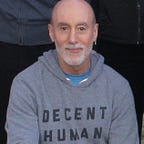Healing America’s Narratives: Moving Toward Community
[Part of a series, this essay turns toward the collective as we continue our exploration of Chapter Eleven of Healing America’s Narratives: The Feminine, the Masculine, & Our Collective National Shadow. Now available.]
As we continue to explore America’s narratives and collective Shadow, it’s essential to remember and pay attention to the interrelationships among individuals, groups, and systems — with systems, as used here, including all of our natural and human-made environments — from the planet itself to big cities, to belief systems, to the technology you’re using right now to read or listen to this essay.
From among those abundant possibilities, we’ll focus here on individual human beings as they come together in search of, or because of, community. One deceptively simple and wonderfully useful approach to community emerged through M. Scott Peck’s work after the publication of his groundbreaking book, The Road Less Traveled, in 1978. He and some colleagues set out to explore what they called community-making, and after some years of experience-based practice — convening groups of individuals to make community — he published The Different Drum: Community-Making and Peace in 1987.
The result, as shared in the book, was the observation, facilitation, and refinement of four stages of community-making—pseudocommunity, chaos, emptiness, and community — during six years of intentional experiments.¹
Briefly, in pseudocommunity, individuals are nice, friendly, and polite — as they try to fake community.
When the facade falls apart, chaos emerges, characterized by attempts to control and fix each other; chaos feels frustrating, exhausting, and further from community.
Eventually, a facilitator suggests the possibility of emptiness, which Peck describes as the hardest, “most crucial stage” — “the bridge between chaos and com-munity” — that requires participants to “empty themselves of barriers to communication,” many of which they have just experienced in chaos. The barriers include expectations, preconceptions, ideology, and attempts to fix, solve, or control.² It is common for individuals to ignore the initial invitation to emptiness, unwilling to let go of what they know and to surrender to the process.
Emptiness requires both the “little deaths” and rebirths of each individual and the larger death of the initial group. “When its death has been completed, open and empty, the group enters community. In this final stage a soft quietness descends. It is a kind of peace. The room is bathed in peace.”³ Peck is clear that true community is not magically permanent; it must be maintained.
Consider your own current relationships and “communities” — in the more common meaning of the word. What stage — pseudocommunity, chaos, emptiness, or true community — characterizes your experience of each? To what extent do the stages emerge and disappear and reemerge during the days, weeks, months, and years of your life?
In light of your, my, and our discrete experiences, how, then, in the name of all that is good (and possible), might we scale such an approach to affect a nation — or even effect a new version of a nation? No easy task, that amid our current chaos.
As we’ll explore in coming essays, large groups of people around the world are already convening and building community, albeit using different language and with very specific focuses. Readers familiar with the work of Otto Scharmer and Thomas Hübl might already see the parallels with Peck’s four stages.
We’ll explore all of this further in coming essays. For now, your homework is to notice the comings and goings of pseudocommunity, chaos, emptiness, and true community in your own life.
Be kind to yourself and others.
- M. Scott Peck, The Different Drum: Community-Making and Peace, (Touchstone-Simon & Schuster, 1987), 86–135.
- Ibid., 95–98. For more on barriers to communication, see also, Marra, Enough with the Talking Points, (2020).
- Ibid., 102–03.
